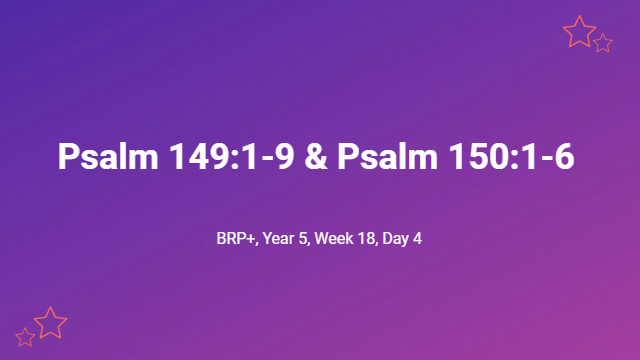Psalm 149:1-9 & Psalm 150:1-6
Q.1. How was Israel urged to praise the Lord? In what unique ways were His people to wage war? How can this be applied today? – (Ps.149:1-9 c.f. 2 Chr.20:14-22; Heb.4:12)
Many people love the old hymns, and reciting ‘the Lord’s Prayer’. However, the significance of the words can easily be lost through repetition. Israel was to keep their worship meaningful by composing new songs (Ps.149:1). This Psalm suggested that we should use all at our disposal to bring our praise to God – Let them praise His name with dancing; Let them sing praises to Him with timbrel and lyre (Ps.149:3). When the Psalmist uses the word ‘exult’, it has the connotation of exuberance and excitement. God is worthy of such worship. Israel was given clear instructions on how to wage war against an enemy and was assured – Do not be fainthearted. Do not be afraid, or panic, or tremble before them, for the Lord your God is the One who goes with you, to fight for you against your enemies, to save you (Dt.20:3-4). God’s presence was invoked by Jehoshaphat, in an historic victory against a massive army. Encouraged by Jahaziel, a Levite, the king ordered the Levites to lead the battle with singing and praises … the Lord set up an ambush … so they were routed (2 Chr.20:22). Today, we are encouraged to wage war against the enemy in spiritual warfare, with the Word of God (c.f. 2 Cor.10:3-6; Eph.6:10-17; Heb.4:12).
Q.2. What is the lesson for us in our approach to worshipping the Lord? Why is such praise appropriate? – (Ps.150:1-6 c.f. Eph.5:17-20; Col.3:16-17)
The final Psalm again endorsed the value of praise. We are to praise God for His creative power, and His sustaining grace. Praise cheers the heart in all circumstances, such as those of Paul and Silas in stocks in the Philippian jail, after receiving a flogging (Acts 16:25). Praise changes our hearts, and lifts our spirits, regardless of the situations we face. We are to use all that is available to bring God praise – Let everything that has breath praise the Lord. Praise the Lord! (Ps.150:6). This is not confined to the Old Testament. It applies much more so under the New Covenant. Not surprisingly, we are encouraged to build up our faith through rehearsing the Truth of the Gospel – 17 So then do not be foolish but understand what the will of the Lord is. 18 And do not get drunk with wine, for that is dissipation, but be filled with the Spirit, 19 speaking to one another in psalms and hymns and spiritual songs, singing and making melody with your heart to the Lord; 20 always giving thanks for all things in the name of our Lord Jesus Christ to God, even the Father (Eph.5:17-20 c.f. Col.3:15-17; Heb.13:15).

